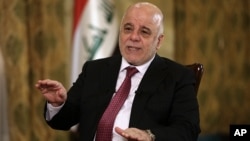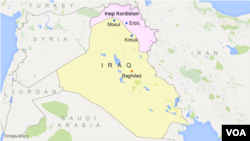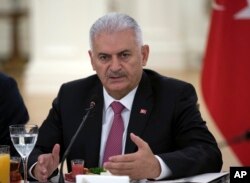Iraq's supreme court has approved a request by Prime Minister Haider al-Abadi to suspend an independence referendum that the country's Kurdistan region planned to hold later this month.
The court said Monday the vote will be on hold until it reviews cases regarding the constitutionality of the vote.
Abadi has repeatedly spoken out against the referendum, including in an interview with the Associated Press on Saturday in which he called the independence vote a "dangerous escalation" that would invite violations of Iraqi sovereignty.
Abadi also told an Iraqi news agency that the Kurds would be "playing with fire" by continuing with plans for the referendum in the three governorates that make up the Kurdish autonomous region.
The Kurdish region has repeatedly ignored calls to cancel the referendum, and the supreme court has little power to implement its order.
Turkish opposition
On Friday, Turkish Prime Minister Binali Yildirim warned that the Iraqi Kurdish plan to hold an independence referendum was a "grave mistake."
Iraqi Kurdistan regional President Masoud Barzani is backing the referendum.
Turkey, which borders the Iraqi Kurdish region, has strong ties with Barzani, but Ankara has been stepping up its pressure to call off the vote.
"We don’t want to impose sanctions, but, if we arrive at that point, there are steps that have been already planned that Turkey can take," Yildirim said.
Ankara, with its own restive Kurdish minority, that mainly borders Iraqi Kurdistan, fears an independent Kurdish state could fuel similar secessionist demands. Those fears are heightened by the suspicion that Syrian Kurds on the Turkish border harbor the same independence ambitions.
US against plan
The United States has voiced strong opposition to the independence vote.
On Friday the White House released a statement saying the United States "does not support" the Kurdish plan to hold a referendum, saying the plan "is distracting from efforts to defeat ISIS and stabilize the liberated areas." Further, it says, "Holding the referendum in disputed areas is particularly provocative and destabilizing."
The Trump administration is calling on the Kurds to cancel the referendum and instead engage in "serious and sustained dialogue with Baghdad," which the U.S. has offered to facilitate.
Iran has also registered its opposition to the referendum, but Turkey arguably has the most leverage on the Iraqi Kurds. The Habur border gate on Turkey's frontier with Iraq is the main trade route to the outside world for Iraqi Kurdistan, while an oil pipeline to the Turkish Mediterranean port of Ceyhan provides a financial lifeline.







